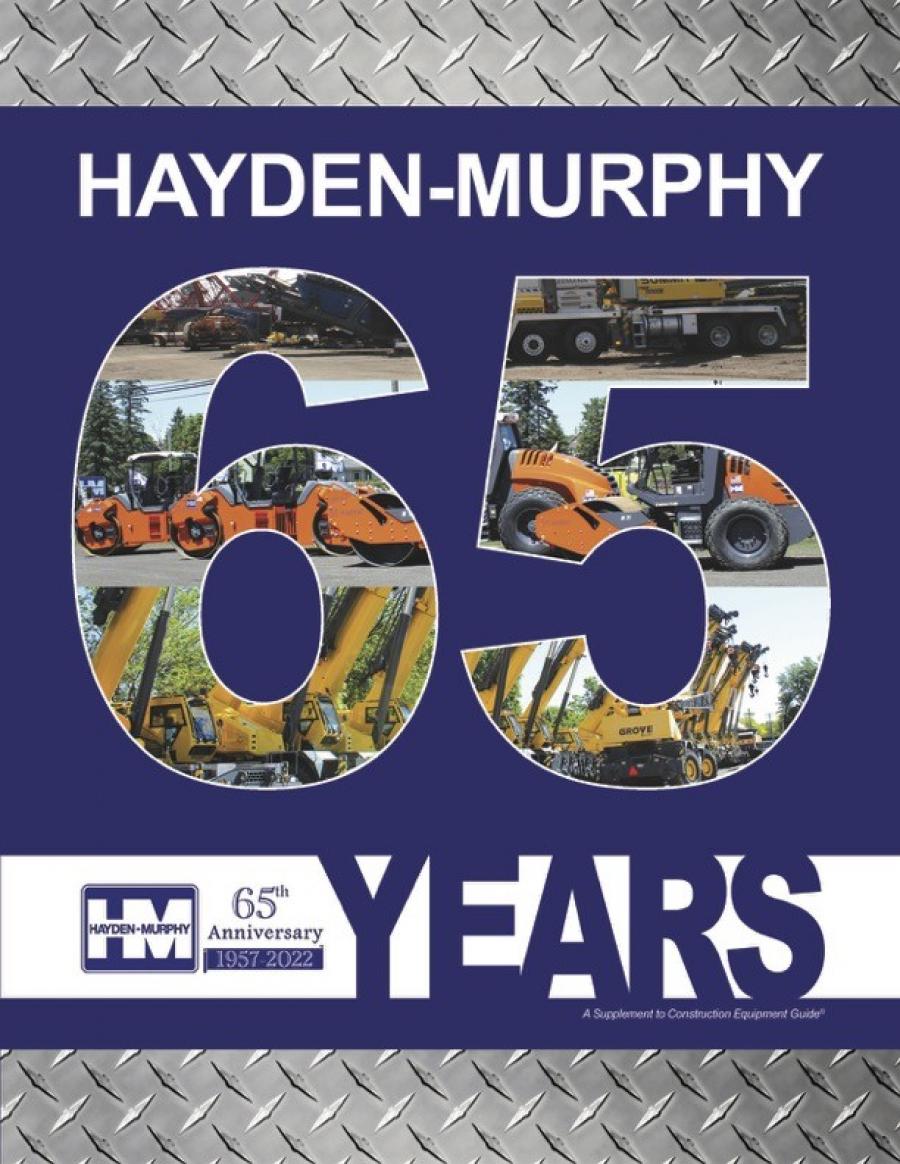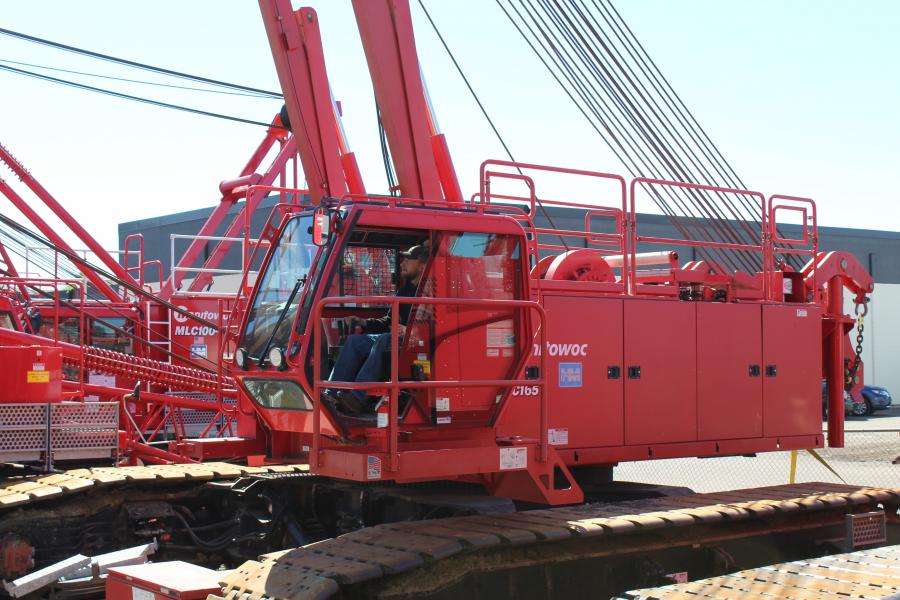Sixty-five years is a long time. Abe Lincoln might have termed it three score and five years ago… when Hank Hayden and Chuck Murphy brought forth an equipment company in Minneapolis dedicated to the proposition that not all dealerships are created equal.
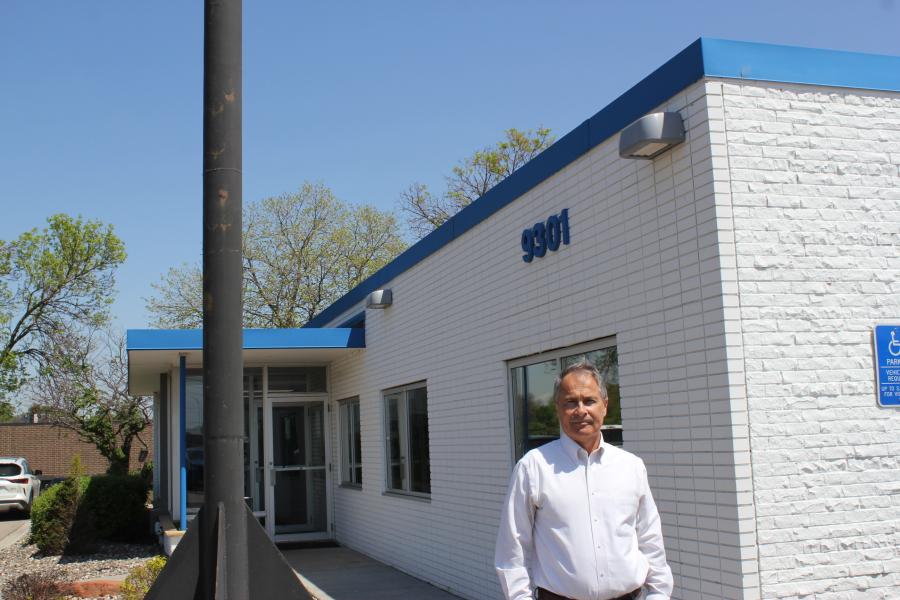
Don Knackstedt, president of Hayden-Murphy.
The founders' goal in 1957 was to establish a business home in Minnesota for selling of "industry-leading products, with superior support, at competitive prices." Those operating standards have been maintained for the life of the company.
General Manager John Beasley said the company mantra can be boiled down to a single word — trust.
"Customer trust is the big one," he said. "Customers know that we are going to do what we say we will do and have the experience to do it. The result is buyer confidence. They know we are going to be there to service their equipment and keep them running."
In the early days, popular brands of equipment included Bay City truck-mounted cranes and diesel-powered Lorain and gas-fueled Byers crawler cranes. Today, the Hayden-Murphy equipment yard is dominated by Manitowoc and Grove cranes, the Wirtgen family of aggregate and paving equipment and other mainstay heavy equipment lines.
The nameplates have changed, but the mission remains the same.
**
Hayden-Murphy Equipment opened its doors in a converted fire equipment station on Hiawatha Avenue in Minneapolis. Nine years later, the company had enjoyed the kind of success that allowed it to relocate to roomier acreage south of Minneapolis — 9301 E. Bloomington Freeway. That single location served the company well for the ensuing 56 years.
In 2022, a second office was opened 150 mi. away in Proctor, near Duluth, in northern Minnesota. Beasley was asked what prompted the change.
"It was about getting closer to our customers," said Beasley. "We wanted to ensure that equipment and service were readily available to customers on that end of the state."
He calls it a satellite office, which is to say it is more of a resource than a permanent facility.
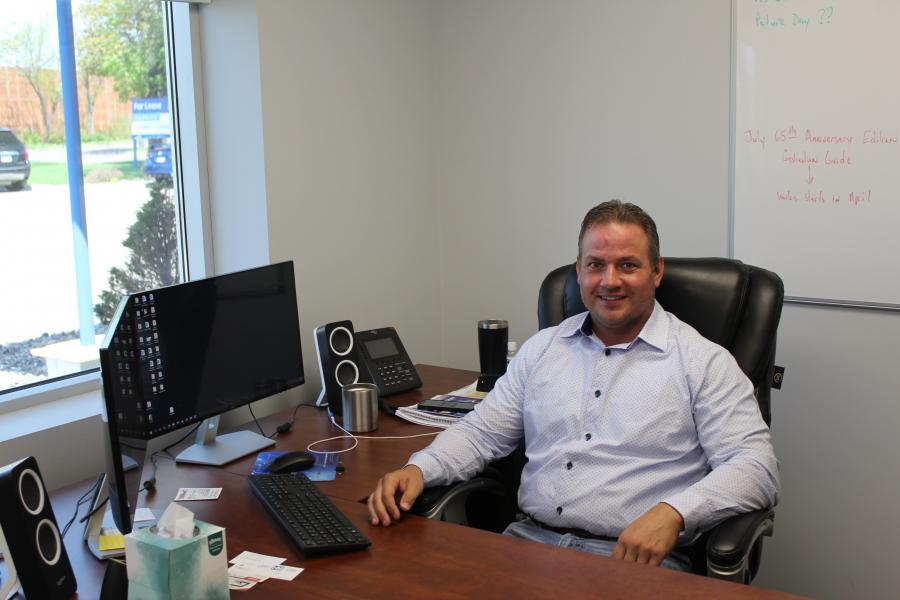
John Beasley, general manager of sales and operations
"We want to service that area better than we have to date. We are down here a couple of hours south of Minneapolis and a lot of our bigger customers are up there. The Proctor office has the parts, equipment and personnel to meet customers' needs there."
The general manager, who came aboard in February 2021, is part of a revamping of administrative operations at Hayden-Murphy. He is the first general manager in the company's history, with some operational management shifting from the executive suite to his front office.
"As the marketplace changes, we are changing as well. Our direction has changed," said Beasley. "The creation of the satellite office was one fruit of the change. We have really amped up our sales and are focusing on customers."
The front line of sales was transferred to a sales manager, Steve Speer, who joined Hayden-Murphy Equipment in March. Speer noted the company has hired three more sales personnel. Two of them are young people who have begun Hayden-Murphy sales training and the third is a 25-year veteran of the industry. The new-hires join a father-son sales team, Mark and Joel Doherty. The father began selling company equipment 40 years ago and the son fully 15 years ago.
"They have a ton of experience," Speer said. "The wealth of experience here is one of the reasons I am on board."
The sales manager himself is no rookie. He has worked in the industry in the region for 17 years. He added that the expectation for a Hayden-Murphy salesman is to be in the field.
"We may see them in the office a couple days a week, but otherwise they are out building relationships," he said.
**
Equipment lines at Hayden-Murphy are iconic, beginning with Manitowoc products. The line-up includes — take a deep breath before you start — Manitowoc lattice-boom cranes; Grove mobile cranes and auxiliary pieces of equipment; Wirtgen milling equipment; Vogele paving units; Kleeman aggregate-handling machinery; Hamm rollers; Link-Belt excavators; Terex-Fuchs scrap-handlers and conveyors; Rammer and Manitou telehandlers.
The machines are dressed in red or yellow, orange or white, green or shades of blue and many of them are huge.
"We have some big, big iron," Beasley said.
The biggest may be a Manitowoc MLC650.
The smallest equipment line the company offers probably is Rammer grapples, hammers, shears and pulverizers — the attachments that make deconstruction doable. The equipment offerings in between are product lines designed to move materials, pave or dig with hydraulic efficiency.
In the Hayden-Murphy equipment yard at any given time is a significant inventory of these machines.
"We invest a lot of money to make sure we have equipment available," said the general manager. "We order and have in stock what the market tells us we should have. In addition, our significant increased investment in parts also sets us apart from most dealers.
"We have contractors in Texas whose equipment we service. We have large corporate customers around the world whose equipment we service — we've been known to travel to Africa," Beasley said. "That's mostly for cranes."
The general manager noted that Hayden-Murphy Equipment is deemed by Manitowoc to be an "elite" dealer. The distinction is accorded Manitowoc distributors who annually move a certain volume of equipment, have sufficient number of trained techs on staff and maintain high levels of customer satisfaction.
"Only a handful of their dealers are considered elite."
Another line of equipment continues to grow in acceptance by Hayden-Murphy customers — Wirtgen. Management is beefing up sales and service staff to support the German manufacturer's offerings, which include Kleeman, Hamm and Vogele.
"We've been a Wirtgen dealer for years, but it's experiencing big growth now," said Beasley.
**
Equipment sales are the driver for the dealership, with the flagship Manitowoc and Wirtgen product lines leading the way.
"Our leading crane products have a very broad presence in the market," Speer said. "We're a Manitowoc-Grove dealer. That said it all."
Yet the heavy equipment marketplace has changed. After the recession of 2008-09 struck the construction industry especially hard, the long-standing option of renting equipment instead of buying it outright was kick-started into a higher gear. Rental activity has increased at Hayden-Murphy, too.
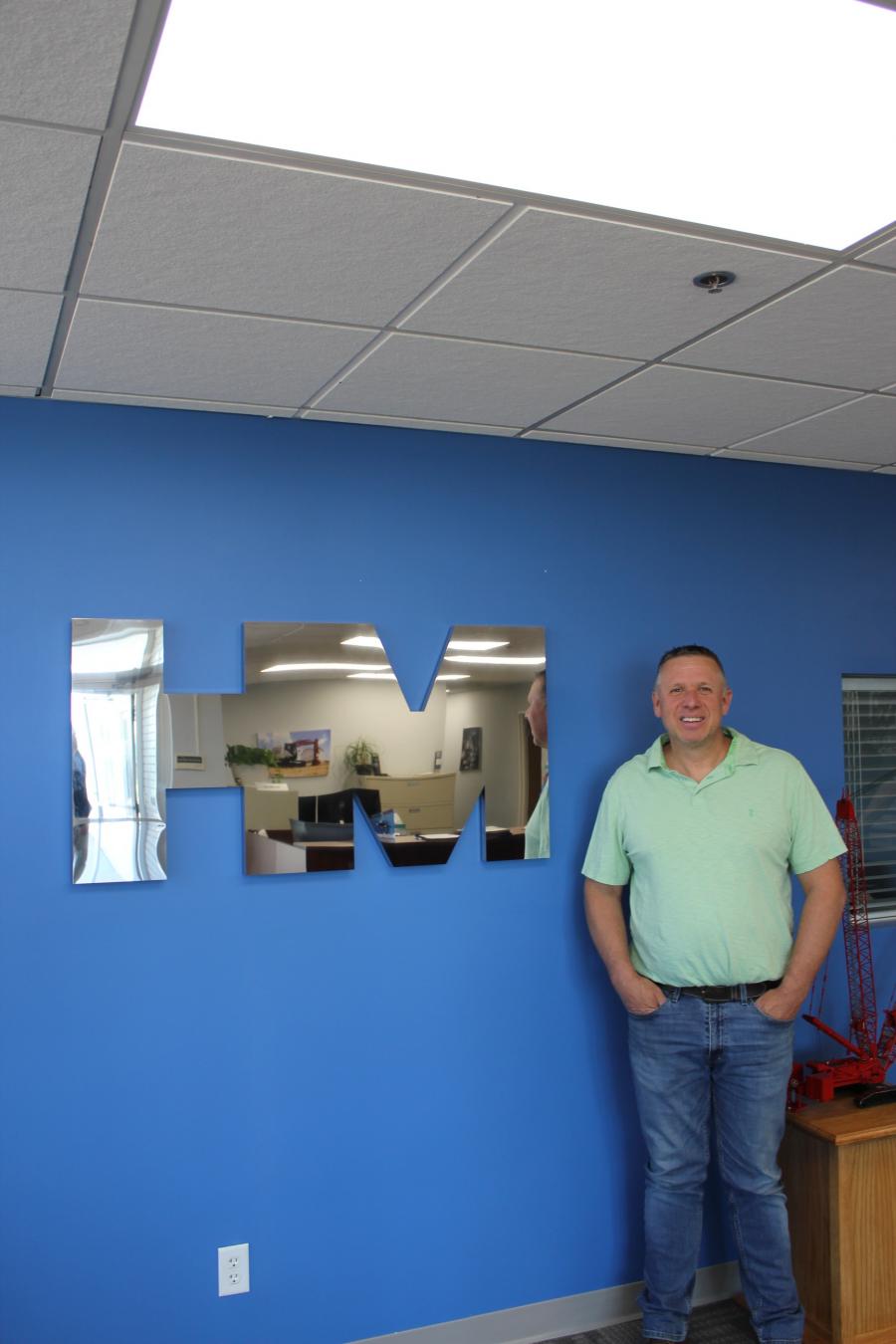
Randy Schmoll, rental manager
"We are more of a rental house than we were, say, five years ago. It's a big part of the business," said Beasley. "It's pegged to the economy. We're seeing more and more rent-to-purchase orders, as well as more rentals because the price of equipment has significantly increased."
Beasley said the rental trend is pretty much across the board in terms of size of contractors. One might assume small and mid-sized contractors would be more impacted by rising costs of equipment, yet Speer believes large contractors also are adding more rentals to their mix of equipment.
"I think the economy plays the biggest part in that decision," he said.
It's a pure dollars-and-sense decision, he said.
"Depreciation models for a contractor sometimes make it more sensible to buy. With more roadwork a possibility in the next two or three years, a contractor might decide to take ownership. But if you only have a couple of jobs in the near future, it makes more sense to rent. We see rental being a bigger part of the business in the next few years."
So where does that put the Hayden-Murphy sales team? Speer said it puts them in the thick of it.
"We have a very active rental manager, but our sales team also drives rentals."
Beasley sees synergy between sales and rentals, rather than conflict, with one contributing to the other and the whole book of business benefiting.
"Ultimately, yes, we are in the business to convert assets. We need to get market share, so, yes, rentals need to convert to sales whenever we can."
The customer's rent-buy decision sometimes is pegged to types of machinery for one reason or another. For instance, the general manager said the company does "a ton" of Grove and Manitowoc lifting unit rentals and is seeing a pickup in customers renting asphalt rollers, milling equipment and pavers.
The rent-to-own conversion rate varies among types of equipment, according to Beasley.
"A lot of times a customer will need an excavator for a couple of months and will rent one. That's not unusual. On the other hand, a majority of crane rentals do turn into sales. That's not as common in other lines."
Speer is confident leasing and renting of heavy equipment is never going to totally replace purchases.
"But sales and rentals numbers may swing back and forth as much as 20 percent from time to time because of the state of the economy."
About half of the 50 employees of Hayden-Murphy Equipment are service techs or tech managers, according to Beasley. The company's mobile techs make their daily runs from either the Bloomington Freeway office or the satellite office in Proctor. That obviously doesn't count the trips to Canada or Africa or California.
Keeping the technicians' knowledge current at a time when machinery is evolving fast is not always a simple task, nor an inexpensive one.
"Hayden-Murphy invests a lot of money in training our techs. We have some of the best crane technicians in the country. We take it very seriously and work very closely with OEMs."
Salespeople also are trained by manufacturers to stay current on the technology of the equipment they represent. The training is virtually constant, Speer said, and is provided either inhouse or in a manufacturing plant.
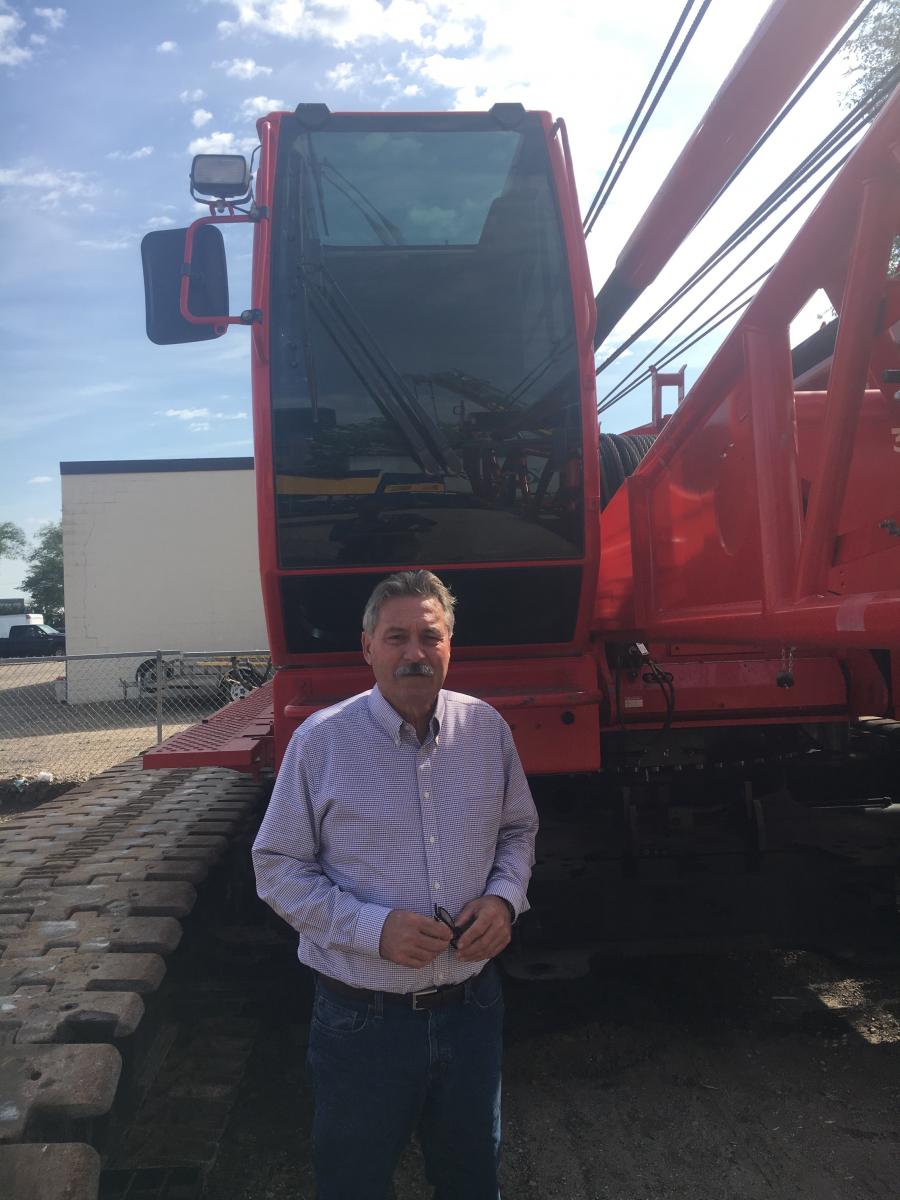
Mark Doherty, sales
The sales manager noted that the company's reputation for service is an asset for the sales force.
"Good customer service has been a Hayden-Murphy tradition for 65 years," said Speer. "That translates into sales. It goes to the customer having confidence that if he buys from Hayden-Murphy, he knows the company has the ability to service the equipment and will have the needed parts."
He said the company's large inventory of parts assures customers that when something quits running, Hayden-Murphy will have the machine running again within 24 to 48 hours. This reputation has been tested in the last year or two, Speer added, because of Covid-induced interruption of supplies.
"Parts management has done a sensational job of keeping parts on the shelves. That has been a task within itself. New equipment delivery dates are constantly changing. We are in constant dialogue with manufacturers to ensure that our build slots aren't missed. Surcharges are being pushed back to us — surcharges on steel and other materials — and that probably has been the biggest speed bump."
**
New employees. Long-time employees. The Hayden-Murphy employee roster is a mix, with 11 people hired in just the last year. The general manager believes such an assortment invigorates a workforce.
"Adding good people in a changing market gives us the opportunity to leverage the knowledge of our senior folks," he said. "The senior people are our assets, sort of our intellectual property. They have a foundation of experience. Capable new people can leverage their experience."
Beasley himself is an example of what he is talking about. The general manager had been in the industry for 25 years when he joined Hayden-Murphy, 21 of those years with Ritchie Bros. Auctioneers. When he left Ritchie, he was director of U.S. sales-agriculture. So why leave the large auction house to help manage a smaller company?
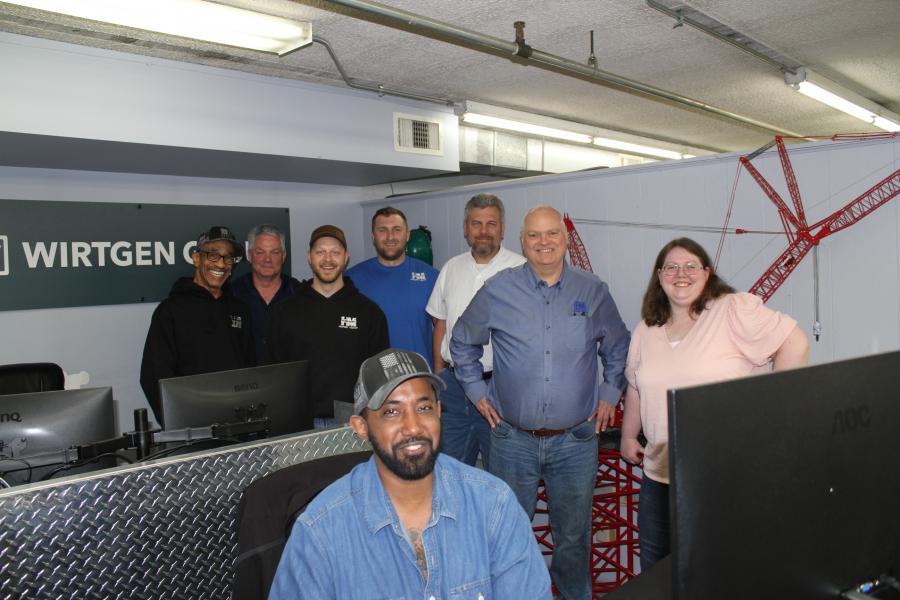
Hayden-Murphy's parts team includes Josh AsRed (C), parts representative; (L-R) Carl Smith, shipping department; Will Kolesar, parts representative; Matt Thiele, parts representative; Ty Carstedt, parts representative; Steven Butler, parts manager; Craig Thrane, parts representative; and Gabriella Butler, parts representative.
"Because of Hayden-Murphy's reputation in the industry and its service record," he said. "It indeed was a smaller company but was very good at what it did. That's what attracted me — the chance to work for a smaller company that was very focused on the customer."
The general manager and sales manager are a couple of the new people, then, who are leveraging the foundational knowledge of people like President Don Knackstedt and other principals in management. Newly hired technicians are leaning on 30-year shop techs like Jim Jostock for guidance. Any new person on the parts counter has the 30 years of experience of Will Kolesar to help him or her learn the ropes.
Why all the longevity? Beasley attributes it to company culture.
"Employees here work in a culture that gives them the freedom to contribute their ideas. Individuals are allowed to come up with good ideas of their own and the company supports them. The other attraction is the family feeling the company has — and some employees actually are related."
Speer concurs.
"My transition in joining Hayden-Murphy has been a very easy one, and I have been welcomed by all the teams. The company does have a family feel and I feel lucky to be a part of the mix."
The goal now is to grow the company without losing the thing that has made it successful for 65 years: service, in a word.
"We want to service our customers and not get away from that," Beasley said. "Growth is important, though not necessarily in opening new stores. I'm talking about growing the customer service experience by having equipment and parts available and expertly servicing what we sell."
Speer believes that Hayden-Murphy Equipment formula will keep the company strong.
"I don't see any chinks in the armor." CEG
Today's top stories



